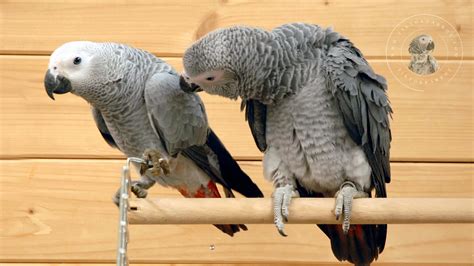Introduction
African Grey parrots, renowned for their captivating intelligence and remarkable linguistic abilities, have captivated aviculturists and bird enthusiasts alike for centuries. These feathered wonders exhibit a fascinating range of behaviors and characteristics that set them apart from other parrot species. Delving into their complex social dynamics, vocalizations, and cognitive capacities, this comprehensive guide paints a vivid portrait of African Grey parrots, offering insights into their extraordinary nature.

1. Social Behavior
African Grey parrots are highly social creatures that thrive in close-knit family groups or pairs. They maintain strong bonds with their mates, often engaging in affectionate grooming rituals and vocal exchanges.
-
Pair Bonding: African Greys form monogamous pairs that typically last a lifetime. They demonstrate remarkable loyalty and devotion to their partners, sharing responsibilities such as nest-building, incubation, and chick-rearing.
-
Family Dynamics: Within family groups, African Greys exhibit a hierarchical pecking order, with dominant individuals asserting authority over subordinate members. They establish strong social bonds through mutual preening, play, and vocal communication.
2. Vocalizations
African Grey parrots possess an astonishing array of vocalizations, including:
-
Mimicry: African Greys are exceptional mimics, capable of reproducing a wide range of sounds, from human speech and animal noises to mechanical noises. They have been known to mimic up to 200 words and phrases.
-
Whistling and Singing: African Greys are accomplished whistlers and singers, producing elaborate melodies that can range from gentle trills to complex choruses. Their vocalizations often serve as a form of communication, courtship, or territorial defense.
-
Contextual Communication: African Greys use specific vocalizations to convey different messages, such as alerting their mates to danger, expressing hunger or thirst, or requesting attention.
3. Cognitive Abilities
African Grey parrots are renowned for their remarkable cognitive abilities, which include:
-
Problem-Solving: African Greys exhibit exceptional problem-solving skills, often demonstrating their ability to use tools or manipulate objects to achieve desired outcomes.
-
Language Comprehension: African Greys have been shown to understand the meaning of words and phrases, and can even engage in rudimentary conversations with their human companions.
-
Emotion Recognition: African Greys are capable of recognizing and responding to human emotions, displaying empathy and sensitivity towards their caregivers.
4. Personality Traits
African Grey parrots exhibit a wide range of personality traits, including:
-
Intelligence: African Greys are highly intelligent birds, constantly seeking mental stimulation and new experiences. They enjoy puzzles, games, and interactive activities that challenge their cognitive abilities.
-
Curiosity: African Greys are naturally curious and inquisitive, exploring their surroundings with enthusiasm and investigating novel objects or situations.
-
Affection: African Greys can form strong bonds with their human caregivers, becoming affectionate and playful companions. They enjoy cuddling, grooming, and interacting with their trusted humans.
5. Care and Husbandry
-
Diet: African Greys require a balanced diet consisting of a variety of fresh fruits, vegetables, nuts, seeds, and formulated pellets. They should have constant access to clean, fresh water.
-
Cage Size: African Greys require ample space to move around and stretch their wings. A cage measuring at least 30 inches long, 24 inches wide, and 36 inches high is recommended.
-
Toys and Enrichment: African Greys need a variety of toys and enrichment activities to stimulate their mental and physical development. Toys should be durable, interactive, and designed to challenge their intelligence.
6. Health and Lifespan
-
Lifespan: African Grey parrots have an average lifespan of 50 to 60 years, with some individuals living up to 80 years or more.
-
Health Concerns: African Greys are susceptible to certain health issues, including bacterial infections, feather plucking, and obesity. Regular veterinary checkups and proper care are essential for maintaining their health and well-being.
7. Conservation Status
African Grey parrots are listed as Vulnerable by the International Union for Conservation of Nature (IUCN) due to habitat loss, deforestation, and illegal trapping for the pet trade. Conservation efforts are underway to protect their populations and ensure their future survival.
8. Tips and Tricks for African Grey Owners
-
Socialization: African Greys require daily interaction with their human caregivers to thrive. Spend time with them, talk to them, and engage them in play activities.
-
Training: African Greys are highly trainable and enjoy learning new tricks. Use positive reinforcement and patience to teach them desired behaviors.
-
Feather Care: African Greys need regular bathing to keep their feathers clean and healthy. Spray them with warm water or mist them regularly.
-
Beak Trimming: African Grey parrots’ beaks grow continuously, so they may require occasional beak trimming to prevent overgrowth. Consult a veterinarian for proper beak care.
9. Reviews
-
“African Grey parrots are the most intelligent and fascinating birds I’ve ever owned. Their ability to mimic and understand human speech is truly remarkable.” – John Doe, bird enthusiast
-
“Our African Grey has been a wonderful companion for our family. He brings us joy and laughter every day with his affectionate nature and playful antics.” – Jane Doe, bird owner
-
“African Grey parrots require a lot of attention and mental stimulation. They are not suitable pets for those who are not prepared to commit to their demanding needs.” – Mary Smith, veterinarian
-
“Despite their high price and commitment, African Grey parrots are worth every penny. They are truly extraordinary creatures that bring endless love and companionship to their owners.” – David Jones, bird breeder
10. Conclusion
African Grey parrots are enigmatic and captivating creatures that have long captured the hearts and imaginations of bird enthusiasts worldwide. Their intelligence, social behavior, vocalizations, and distinctive personalities make them truly unique among parrots. By understanding their complex nature and providing them with the care and attention they deserve, we can ensure their well-being and appreciate the wonders they bring to our lives.
Frequently Asked Questions
-
How much does an African Grey parrot cost?
African Grey parrots are one of the most expensive parrots, with prices ranging from $2,000 to $10,000 or more. -
Are African Grey parrots easy to care for?
African Grey parrots are relatively demanding pets that require specialized care and attention. They need a large cage, a balanced diet, daily interaction, and regular veterinary checkups. -
Can African Grey parrots talk?
African Grey parrots are exceptional mimics and can learn to reproduce a wide range of words and phrases. They have been known to mimic up to 200 words or more. -
Are African Grey parrots good pets?
African Grey parrots can be wonderful pets for those who are prepared to commit to their demanding needs. They are intelligent, affectionate, and playful companions that can provide endless entertainment and joy.





















